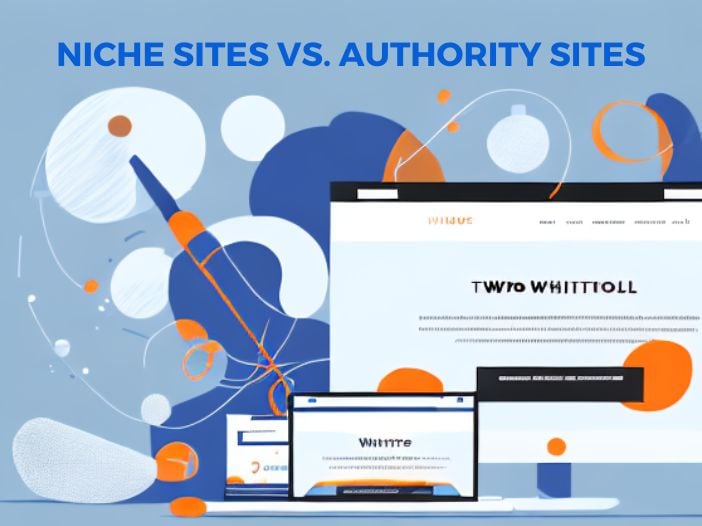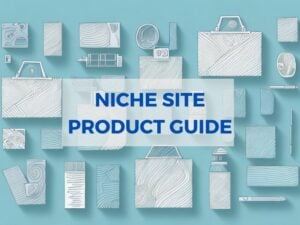Creating a niche website or an authority website has many benefits if you choose this as your route to online business and cash flow.
While both are viable options, each has unique advantages and disadvantages that are important to consider before making a decision.
Understanding Niche and Authority Websites
Before I go any further, let’s take a moment to define exactly what we mean by niche and authority websites.
When it comes to creating a website, it’s essential to have a clear understanding of your goals and target audience.
This is where the concept of niche and authority websites comes in.
Defining Niche Websites
A niche website focuses on a specific topic or audience, typically within a smaller market.
Niche websites are designed to cater to a specific group of people who share a common interest or need. For example, a website about knitting patterns for pet sweaters would be considered a niche website.
One of the advantages of niche websites is that they allow you to establish yourself as an expert in a particular area.
By focusing on a specific topic, you can develop a deep understanding of it and create content tailored to your audience’s needs. Niche websites tend to be smaller and more focused, with a narrow range of topics covered.
It’s important to note that niche websites can also have their drawbacks.
Because they are focused on a smaller market, there may be limited opportunities for growth and expansion.
Additionally, it can be challenging to attract a large audience if your topic is very specific.
Defining Authority Websites
In contrast, an authority website is a more extensive, comprehensive website that covers a broader range of topics within a particular niche.
It’s designed to be a go-to resource for people interested in that topic, offering in-depth information and expert advice.
For example, a website about pet care that covers everything from food to grooming to health issues would be considered an authority website.
One of the advantages of authority websites is that they have the potential to attract a much larger audience.
Since they cover a wider range of topics, they can appeal to a broader group interested in the niche.
Additionally, because they are seen as authoritative sources of information, they can attract high-quality backlinks and establish a strong online presence.
However, creating an authoritative website can be a challenging and time-consuming process.
Creating high-quality content that covers various topics requires a significant investment of time and resources.
Additionally, because the competition in this space can be fierce, it can be challenging to establish yourself as a trusted authority.
Ultimately, creating a niche or authority website will depend on your goals and resources.
Both types of websites have advantages and disadvantages, and it’s essential to carefully consider your options before deciding.
Key Differences Between Niche and Authority Websites
When building a successful website, there are two main approaches to consider: niche and authority.
Content Focus and Scope
One of the main differences between niche and authority websites is the focus and scope of their content.
Niche websites tend to have a much narrower focus, with content tailored to a specific audience or topic.
A niche website might focus on a specific type of food, such as vegetarian cuisine, or a specific hobby, such as knitting.
This allows the website to become an expert in that area, providing valuable information and resources to a highly targeted audience.
On the other hand, authority websites cover a wider range of topics within a given niche and often provide more in-depth information on those topics.
For example, an authority website about fitness might cover everything from weightlifting to yoga to nutrition.
This broader scope allows the website to appeal to a wider audience and establish itself as a go-to resource within that niche.
Target Audience
Another vital factor to consider is the target audience. Niche websites cater to a specific audience with specific interests.
This can be beneficial because it allows the website to speak directly to that audience and build a loyal following. However, it can also limit the website’s potential reach.
Authority websites aim to appeal to a broader range of people within the same niche.
This can be beneficial because it allows the website to reach a larger audience and potentially generate more traffic.
However, creating content that appeals to such a wide range of people can also be more challenging.
Website Size and Structure
The size and structure of your website will also play a role in determining whether to pursue a niche or authority approach.
Niche websites are typically smaller and more straightforward, with fewer pages and less complex designs.
This can be beneficial because it makes the website more focused and easier to navigate. However, it can also limit the website’s growth and revenue generation potential.
Authority websites tend to be larger and more complex, with a wide range of pages and features.
This can be beneficial because it allows the website to provide a more comprehensive resource for its audience.
However, managing and maintaining such a large website can be highly challenging.
Revenue Generation Methods
It’s essential to consider how you plan to generate revenue from your website.
Niche websites often rely on targeted advertising or affiliate marketing to generate income.
This can be effective because it allows the website to promote products or services directly relevant to its audience. However, it can also limit the website’s potential for revenue generation.
Authority websites may have more diverse revenue streams, such as sponsorships, e-commerce sales, or subscription models.
This can be beneficial because it allows the website to generate income from multiple sources. However, it can also be more challenging to establish these revenue streams and manage them effectively.
Ultimately, the decision to pursue a niche or authority approach will depend on various factors, including your goals, resources, and target audience.
By understanding these differences, you can make an informed decision about which one is best for your website.
Pros and Cons of Niche Websites
When creating a website, there are many factors to consider.
While there are advantages and disadvantages to both approaches, in this article, we’ll focus on the pros and cons of niche websites.
Advantages of Niche Websites
- Targeted audience: By focusing on a specific niche, you can attract a highly targeted audience who are already interested in your offer. This means that your website will be more likely to receive traffic from people genuinely interested in your content, products, or services.
- Easier to establish authority: Niche websites can establish themselves as authorities in their specific niche more easily due to their focused content and audience. By consistently producing high-quality content relevant to your niche, you can become a go-to source of information for your audience.
- Less competition: By targeting a smaller, more specific audience, you may face less competition than operating in a broader market. This can make it easier to rank in search engines and attract traffic to your website.
Overall, niche websites can be an excellent choice for those who are passionate about a specific topic and want to create a website that reflects that passion.
By focusing on a niche, you can create a highly targeted, authoritative website with less competition.
Disadvantages of Niche Websites
- Limited growth potential: Because niche websites are focused on a specific topic or audience, they can limit growth potential. Once you’ve covered all the relevant topics in your niche, expanding your website and attracting new visitors can be challenging.
- Less diverse revenue streams: Niche websites may struggle to generate income from various sources, which can limit their earning potential. For example, if your website is focused on a specific product or service, you may only be able to generate income through affiliate marketing or advertising.
- Less room for error: With fewer topics to cover, niche websites must consistently produce high-quality content to maintain their audience and authority. This can be challenging, as there is less room for error, and your audience may be more critical of any mistakes or inaccuracies.
While there are certainly some disadvantages to creating a niche website, the advantages can often outweigh these.
Ultimately, the decision to create a niche website or a more general one will depend on your goals, interests, and resources.
Pros and Cons of Authority Websites
Advantages of Authority Websites
- Wider reach: Authority websites can attract a wider audience due to their broader range of content and expertise within a given niche.
- Diverse revenue streams: A well-established authority website may have multiple sources of revenue, including sponsorships, e-commerce sales, and more.
- Greater growth potential: By covering a wider range of topics, authority websites may have more potential for growth and expansion.
Authority websites are a great way to establish yourself as an expert in your chosen field.
By providing a wide range of content and expertise, you can attract a wider audience and establish yourself within your niche as a thought leader. This can lead to increased visibility, credibility, and, ultimately, increased revenue.
One of the most significant advantages of authority websites is their ability to generate diverse revenue streams.
With a well-established authority website, you can generate revenue from various sources, including sponsorships, e-commerce sales, and more.
This can provide a stable and sustainable source of income for your business.
Another advantage of authority websites is their greater potential for growth and expansion.
Covering a wider range of topics can attract a wider audience and expand your reach.
This can lead to increased traffic, engagement, and, ultimately, increased revenue.
Disadvantages of Authority Websites
- Longer time to establish: Because authority websites cover a wider range of topics, establishing authority and gaining a significant following may take longer.
- More competition: With a broader range of topics, authority websites may face more competition within their niche.
- Complexity: As authority websites grow in size and scope, they can become more complex to manage and maintain.
While there are many advantages to authority websites, there are also some disadvantages to consider.
One of the biggest challenges of authority websites is the time and effort required to establish authority and gain a significant following.
With a broader range of topics, it can be more challenging to establish yourself as an expert in your field.
Another challenge of authority websites is the increased competition within your niche. With a wider range of topics, you may be competing with a more significant number of websites and businesses.
This can make standing out and attracting a loyal audience more challenging.
Finally, as authority websites grow in size and scope, they can become more complex to manage and maintain.
This can require a significant investment of time and money and may require hiring additional staff or outsourcing certain tasks.
Overall, authority websites can be a powerful tool for establishing yourself as an expert in your field and generating revenue.
Considering the potential advantages and disadvantages before pursuing this approach is essential.
Choosing the Right Approach for Your Online Business
Assessing Your Goals and Resources
When choosing between a niche or authority website approach, it’s essential to consider your goals and resources.
A niche website may be a better fit if you have limited resources and are looking for a specific, targeted audience.
An authority website may be more suitable if you have more resources and are looking for broader growth potential.
Evaluating Market Opportunities
Another key factor to consider is the market opportunities within your niche.
If there are many established authority websites within your niche, gaining traction and establishing yourself as an authority may be more challenging.
On the other hand, if there are few established niche websites, there may be a gap in the market that you can fill.
Balancing Long-term Growth and Short-term Success
Ultimately, deciding whether to pursue a niche or authority website should consider both short-term success and long-term growth potential.
While a niche website may provide quick success and targeted income streams, an authoritative website may offer more significant long-term growth potential and diverse income streams.
In Conclusion
Whether you choose to focus on a niche or authority website approach, each has pros and cons.
Understanding the differences between the two and considering your goals and resources will help you make an informed decision and build a successful online business.





